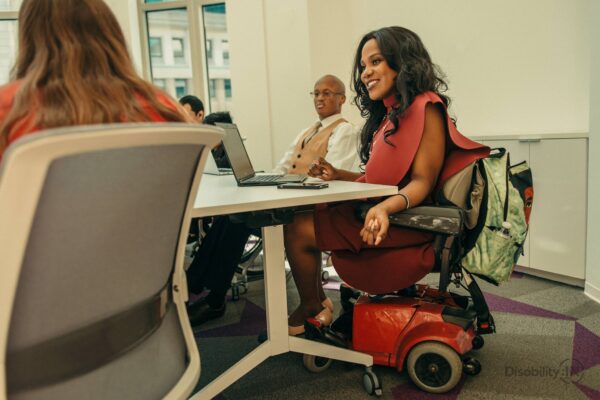In this blog, our Campaigns and Training Coordinator, Bea, shares her experience of our experimentally inclusive recruitment process. Accessibility is an ongoing journey and we’re always willing to try anything new to get it right for folks. Bea is developing our Disability Inclusion at Work training, which you can find more information on here.
Inclusive recruitment and the business of interviews
I don’t suppose it’s much of a revelation to anyone that I get very nervous when faced with a job interview. Must people do, and I envy the minority that don’t. Of course, the reason why interview anxiety happens isn’t just to do with the stakes involved. Being successful, getting the post, and feeling the approval of passing the test, are all obvious causes of that quivery stomach feeling.
But there’s also the nature of ego. Each person’s sense of worth comes under scrutiny when faced with an interview panel. It’s the unknown judgments that they are about to make. In the great majority of interviews there’ll be cross-examination: the panel will take turns asking on-the-spot questions that the interviewee may, or may not, be familiar with. Consequently, how many of us have finished an interview and thought to ourselves “Good grief! I made a complete mess of that! My brain just seized up!”.
The worst thing is, one hardly ever give of one’s best in these situations. How much worse is it for disabled people? Perhaps there’s been a struggle to get to the venue, problems with attitudes and assumptions, and then after all that stress they face the challenging interrogation. But reading the minds of an interview panel always seems to me to be a strange way to get yourself a job. Maybe a better method is possible?
I was lucky enough to get my current post with Difference North East (DNE) via an interview system that was subtly different from my usual experiences. Consider the following:
No application forms
a) I didn’t have to complete an application form. This is excellent! I have a long and complex work/education history and typing all this stuff into forms is both incredibly tedious and problematic. What to I keep in? Leave out? Emphasise? How far back into my past? Instead, DNE asked me to describe my work and background using any media I considered appropriate (and in an informal manner that showed my imagination). It was, for the first time, quite a lot of fun to actually ‘talk’ about myself in a frank and humorous way at an interview. The activity let me be myself, which I gather is the whole point of doing it? Why don’t most employers use this approach? No idea, though my guess is that they just use traditional methods so as to avoid complexities.

Photograph by Jordan Nicholson from Disability:IN.org
Sharing interview questions in advance
b) I was told what the interview questions were ahead of time. This was a great relief, as it let me take time to think about examples from my past that I could use in my responses. Clearly, the idea of interview questions are to find out a little about a candidate’s attitudes and experiences. The only reason for keeping questions confidential is to test how quickly a person can think. And unless that’s one of the criteria for the role, it seems a pointless extra stress point. One that actually militates against a candidate giving of their best.
This was a far less anxious interview experience, and I am of the opinion that DNE got a far better picture of me and my background than they would otherwise. I would highly recommend the ‘Difference Approach’ to other organisations when recruiting. Allow candidates to be authentic, not to put up a fake image of themselves. Take away the stress, and you get a better view of the person concerned.
You can find lot’s of useful resources about inclusive recruitment and employment at our Disability at Work Resource Hub
If you or your organisation is interested in our Disability Inclusion at Work Training, you can contact Bea@differencenortheast.org.uk or on the phone at 07958994677.
